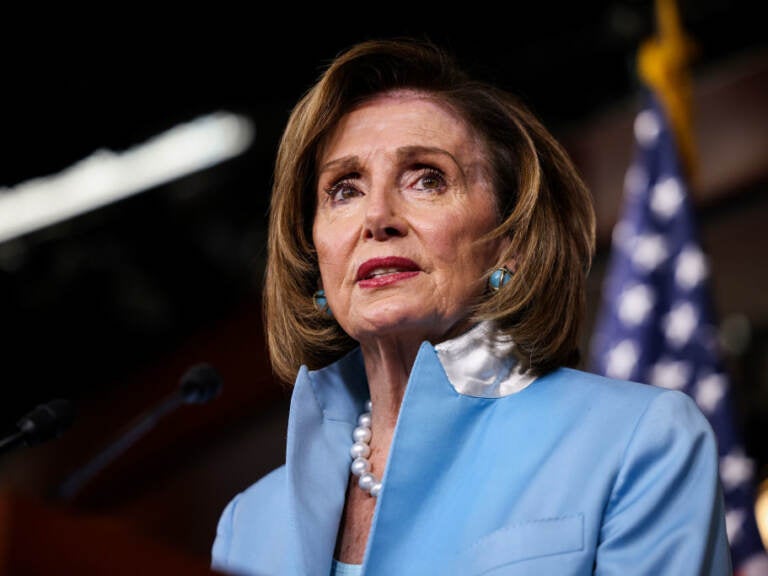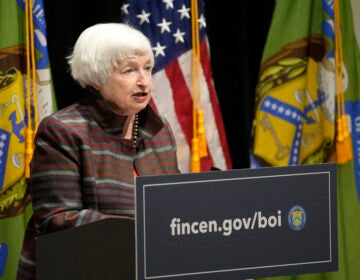House narrowly approves $3.5 trillion budget blueprint

House Speaker Nancy Pelosi (D-CA) speaks at her weekly news conference at the Capitol building on August 06, 2021 in Washington, DC. (Anna Moneymaker/Getty Images)
The House of Representatives narrowly approved a budget resolution that provides the framework for a $3.5 trillion spending deal following an impasse between House leaders and centrist Democrats that threatened to derail progress on the vast majority of President Biden’s domestic agenda.
Tuesday’s vote was 220-212 along party lines.
House leaders used a procedural workaround to avoid a lengthy battle and a separate vote on the budget resolution itself, but the rift between Democrats over how far Congress should go in reshaping the role of the federal government is still unresolved.
At odds were a group of moderates who wanted to vote now on a Senate-passed, bipartisan infrastructure bill instead of following through with a two-track strategy, whereby infrastructure and the broader spending bill would advance in tandem.
Party leaders say they hope to finish work on a spending bill by Oct. 1, leaving just weeks to address serious concerns among centrists over the cost of Biden’s spending plans.
Democrats are attempting to move forward with this spending legislation without the support of any Republicans — a plan that gives leaders little room for error.
Pelosi insisted two domestic bills should be tied together
House Speaker Nancy Pelosi, D-Calif., pursued a strategy of tying the fate of a $1 trillion bipartisan infrastructure bill to the broader spending plan full of Democratic priorities. She has repeatedly insisted the House would not vote on the infrastructure bill until the Senate passes the larger spending package. Progressives worry advancing a vote on infrastructure could lose much-needed momentum for the broader budget.
After hours of late-night talks Monday, Democratic leaders offered a compromise to the centrists who called for a vote on the infrastructure bill. Pelosi agreed to add the budget vote into a procedural measure and add a provision specifying that the House would vote on the infrastructure bill by Sept. 27.
The procedural vote also set up debate and a vote on a voting rights bill for later Tuesday.
“Passing an infrastructure bill is always exciting for what it means in terms of jobs and commerce in our country,” Pelosi said in a statement Tuesday afternoon announcing her commitment to the Sept. 27 deadline. “We must keep the 51-vote privilege by passing the budget and work with House and Senate Democrats to reach agreement in order for the House to vote on a Build Back Better Act that will pass the Senate.”
Each of the moderate lawmakers who had demanded an early vote on infrastructure ultimately fell into step with Pelosi and voted for the measure. While they got a commitment on a date certain on the bipartisan bill, they did not extract any assurances on the size or substance of the policies in the broader bill.
Pelosi and other leaders have insisted that the only way to make good on promises to address climate change and provide support to workers and families is to tie the two bills together.
“I know we will succeed because of the confidence I have in the shared values of all in our Caucus for America’s working families,” Pelosi told Democrats in a letter sent Monday as negotiations dragged on between the two camps. “The success of each bill contributes to the success of the other.”
As leaders worked to find the votes for the compromise, Pelosi told reporters Tuesday morning, “When we bring up the bill, we will have the votes.”
The House adopted the same budget resolution that was approved this month in the Senate. Democrats plan to use a feature of the budget process, known as reconciliation, to avoid a Republican filibuster in the Senate. But there is little agreement on what should be included once a budget is passed.
Some moderate Democrats argued infrastructure investments can’t wait
A group of nine centrist Democrats, led by Rep. Josh Gottheimer, D-N.J., had released statements demanding an immediate vote on the Senate-passed infrastructure bill.
“We have the votes to pass this legislation right now, which is why I believe we should first vote immediately on the bipartisan infrastructure package, send it to the President’s desk, and then quickly consider the budget resolution, which I plan to support,” Gottheimer wrote. “We need to get people to work and shovels in the ground.”
A 10th moderate, Rep. Stephanie Murphy of Florida, released an op-ed Monday night criticizing Democratic leaders linking the two bills, saying it was “poor legislative strategy” and vowing, “I cannot in good conscience vote to start the reconciliation process unless we also finish our work on the infrastructure bill.”
Progressive members have said the bipartisan bill is insufficient and falls short of Biden’s promises. Rep. Pramila Jayapal, D-Wash., chairwoman of the Congressional Progressive Caucus, has framed the budget bill as the best way for Democrats to pass priorities such as addressing climate change, federal funding for family support like child care and money for education.
“The American people delivered us the House, Senate, and White House not only to improve roads and bridges, but to improve their daily lives, too,” Jayapal said in a statement after the Senate advanced the budget. “We can do that by using this governing moment to ensure that President Biden’s complete agenda is realized.”
The centrist Democrats have support from their ideological counterparts in the Senate
Sens. Kyrsten Sinema, D-Ariz., and Joe Manchin, D-W.Va., have both supported the push for the House to vote on the bipartisan bill immediately while leaders work out differences on the bigger plan.
Sinema went a step further Monday when her spokesman, John LaBombard, issued a statement saying the senator “will not support a budget reconciliation bill that costs $3.5 trillion.”
Leaders hope to pass both bills before the end of September. But the difficulty of getting Democrats to agree how to take this procedural step means the process of writing the details of the spending bill and agreeing to a final price tag is likely to be incredibly contentious — just within the Democratic caucus.
Soon after the House vote, Jayapal put down a marker saying progressives’ position was “unchanged” on moving the bills together. “As our members have made clear for three months, the two are integrally tied together, and we will only vote for the infrastructure bill after passing the reconciliation bill.”
9(MDAzMzI1ODY3MDEyMzkzOTE3NjIxNDg3MQ001))




